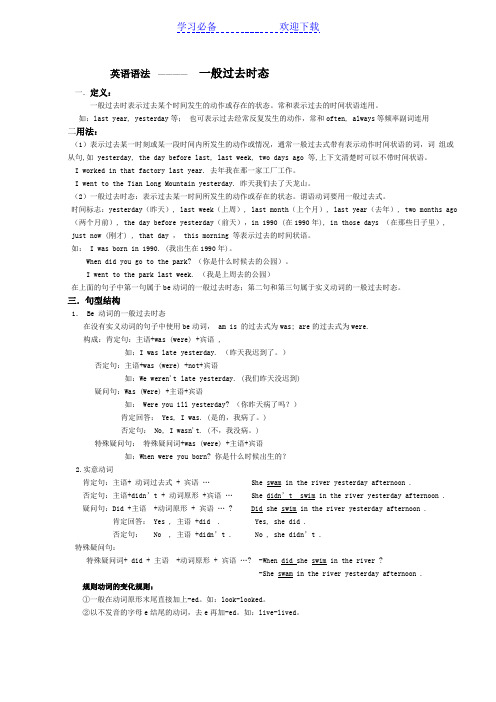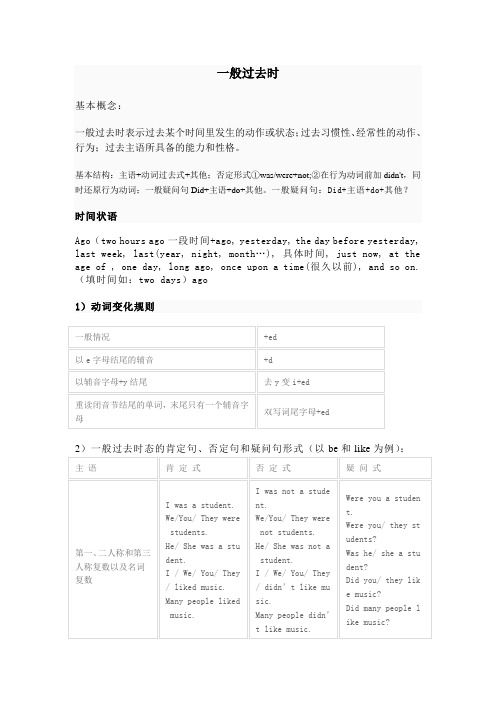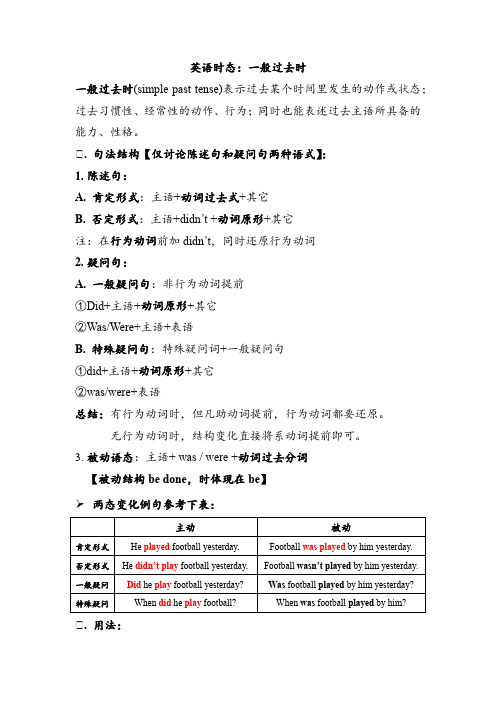一般过去时态
英语语法-一般过去时态

英语语法————一般过去时态一.定义:一般过去时表示过去某个时间发生的动作或存在的状态。
常和表示过去的时间状语连用。
如:last year, yesterday等;也可表示过去经常反复发生的动作,常和often, always等频率副词连用二用法:(1)表示过去某一时刻或某一段时间内所发生的动作或情况,通常一般过去式带有表示动作时间状语的词,词组或从句,如 yesterday, the day before last, last week, two days ago 等,上下文清楚时可以不带时间状语。
I worked in that factory last year. 去年我在那一家工厂工作。
I went to the Tian Long Mountain yesterday. 昨天我们去了天龙山。
(2)一般过去时态:表示过去某一时间所发生的动作或存在的状态。
谓语动词要用一般过去式。
时间标志:yesterday(昨天), last week(上周), last month(上个月), last year(去年), two months ago (两个月前), the day before yesterday(前天),in 1990 (在1990年), in those days (在那些日子里), just now (刚才) , that day , this morning 等表示过去的时间状语。
如: I was born in 1990. (我出生在1990年)。
When did you go to the park? (你是什么时候去的公园)。
I went to the park last week. (我是上周去的公园)在上面的句子中第一句属于be动词的一般过去时态;第二句和第三句属于实义动词的一般过去时态。
三.句型结构1. Be 动词的一般过去时态在没有实义动词的句子中使用be动词, am is 的过去式为was; are的过去式为were.构成:肯定句:主语+was (were) +宾语 ,如:I was late yesterday. (昨天我迟到了。
一般过去时时态

一般过去时基本概念:一般过去时表示过去某个时间里发生的动作或状态;过去习惯性、经常性的动作、行为;过去主语所具备的能力和性格。
基本结构:主语+动词过去式+其他;否定形式①was/were+not;②在行为动词前加didn't,同时还原行为动词;一般疑问句Did+主语+do+其他。
一般疑问句:Did+主语+do+其他?时间状语Ago(two hours ago一段时间+ago, yesterday, the day before yesterday, last week, last(year, n ight, month…), 具体时间, just now, at the age of , one day, long ago, once upon a time(很久以前), and so on.(填时间如:two days)ago1)动词变化规则2)一般过去时态的肯定句、否定句和疑问句形式(以be和like为例):3)一般过去时的用法:1.过去发生的动作。
例如:The police stopped me on my way home last night.2.过去存在的状态。
例如:They weren't able to come because they were so busy.3. 常用于一般过去时的时间状语:yesterday,three months ago,last year,in 1979,often,always 例题解析:举一反三,学的更轻松!1. r. Mott is out. But he ______ here a few minutes ago.A. wasB. isC. will beD. would be解析:时分钟前发生的动作,应该用一般过去时。
应选 A,2.---Hi, Tom.---Hello, Fancy. I ______ you were here.A.don't knowB.won't thinkC. thinkD. didn't know解析:虽然句中没有明确的时间状语,但是可以通过上下文语境判断出,我说这话之前不知道,但是现在知道了,表示过去的动作,要用过去时态。
一般过去时时态

一般过去时班级姓名一般过去时的功能:一般过去时表示过去某个时间发生的动作或存在的状态,常和表示过去的时间状语连用。
一般过去时也表示过去经常或反复发生的动作。
一般过去时的构成:1.be动词:主语+be动词过去式(was, were)+其它。
e.g:I was a student twenty years ago.注意:在一般过去时中主语单数be动词用was, 主语复数be动词用were。
2.行为动词:主语+行为动词过去式(+其它)。
e.g:We watched TV last night.。
一般过去时标志用语Just now, a moment ago, …ago, yesterday, last…,on Sunday中文“了”动词过去式的变化规则1.一般情况下,直接加-ed,如:pull-pulled, cook-cooked2.以e结尾只加d,如:taste-tasted3.以“辅音字母+y”结尾,变y为i, 再加-ed,如:study-studied4. 双写末尾的辅音字母,再加-ed,如:stop-stopped5.不规则的单独记练习:一、写出下列动词的过去式am/is are study play gohave/has meet do/does sing eatmake read see sit tell二、用be动词的适当形式填空1.They _______ glad to see each other last month.2.He ________ at the camp last week.3.I _____ an English teacher, but I _______ a middle schoolstudent twentyyears ago.4.Yang Ling ________ eleven years old last year.5.There ________ a lot of milk in the glass ten minutes ago.6.There ________an apple on the plate yesterday.7.There ________ some cakes in the fridge on Sunday.8.Today _______ the second of June. Yesterday ______ the first of June. It_____ Children's Day. All the students ______ very excited.二、用所给词的适当形式填空1. We often___________(play) in the playgound.2. He _________(see) a play last Friday.3. What (do) he usually (do) after school?4. Danny (study) English,Chinese,Maths, Science and Art at school.5. The sign on the grass (mean)‘Keep off the grass’.6. ________ Mike________(read) English every day?7. Did you (fly) kites? No, I (make) a kite.8. Where you a moment ago? I in the bedroom. (be)9. We _______ (have) a party last Halloween.10. __ they _____ (play) chess in the classroom last PE lesson?11. My parents didn’t ________ (work) last Friday.12、I ________ (not taste) oranges on the farm yesterday.三、中译英1. 我们上周五看了一部电影。
一般过去时态(详细)

Simple Past Tense
He is busy now. He was busy just now. We have six classes every day. We had six classes yesterday. He works hard at every lesson. He worked hard at every lesson.
My father often went to work by bus last year.
3.表示已故人所做的事情。
Comrade Lei Feng did good deeds in his life. 雷锋同志做了一生的好事。 The book was written by Mr. Liang Shiqiu. 这本书是梁实秋先生写的。
规则动词过去式的构成
一般动词原形末尾加-ed。 如:look→looked, stay→stayed ; 以e结尾的动词只加-d。 如:hope→hoped, live→lived;
末尾只有一个辅音字母结尾的重读闭音节的动词,应先双 写这个辅音字母,再加-ed. 如:stop→stopped, plan→planned;
否定句式:主语 + 情态动词 + not + 其它. Eg:I could not swim when I was 7 years old.
一般疑问句:情态动词 + 主语 + 其它 Eg : Could you swim when you were ten years old?
特殊疑问句式: 特殊疑问词+情态助动词过去式+主语+动词原形+其 他 What could she do twenty years ago?
英语时态:一般过去时

英语时态:一般过去时一般过去时(simple past tense)表示过去某个时间里发生的动作或状态;过去习惯性、经常性的动作、行为;同时也能表述过去主语所具备的能力、性格。
Ⅰ. 句法结构【仅讨论陈述句和疑问句两种语式】:1.陈述句:A. 肯定形式:主语+动词过去式+其它B. 否定形式:主语+didn’t +动词原形+其它注:在行为动词前加didn’t,同时还原行为动词2.疑问句:A. 一般疑问句:非行为动词提前①Did+主语+动词原形+其它②Was/Were+主语+表语B. 特殊疑问句:特殊疑问词+一般疑问句①did+主语+动词原形+其它②was/were+表语总结:有行为动词时,但凡助动词提前,行为动词都要还原。
无行为动词时,结构变化直接将系动词提前即可。
3.被动语态:主语+ was / were +动词过去分词【被动结构be done,时体现在be】➢两态变化例句参考下表:Ⅰ. 用法:1.一般过去时表示在过去某个特定时间发生,也可以表示过去习惯性、经常性的动作。
(一般不强调动作的影响,只说明的事情。
)I talked with Catherine yesterday morning.His mother cooked him breakfast.2.一般过去时常与表示过去的时间状语或从句连用,如:yesterday, last week, in the past, in 1993, at that time, once, during the war, before, a few days ago, when 等。
3.表示过去连续发生的动作时,要用过去时。
这种情况下,往往没有表示过去的时间状语,而通过上下文来表示。
The boy cried for a while,and then drank a cup of tea.4.表示在此之前一段时间内经常或反复的动作。
常与always,never 等连用。
一般过去时态

请用正确动词形式填空。
1. I _________ (have) an exciting party last weekend. 2. _________ she _________(practice) her guitar yesterday? no, she _________. 3. what ________ tom ________ (do) on saturday evening? he ________(watch) tv and __________(read) an interesting book. 4. they all _________(go) to the mountains yesterday morning.
2、实义动词的一般过去时态
A、实义动词的过去式的变化规则: (1).直接加ed:work—— worked look——looked , (2).以不发音e结尾的单词,直接加d:live —— lived hope——hoped use——used, (3) 以辅音字母+y结尾的,变y为i加ed:study—— studied carry——carried worry——worried, (4)以元音字母+y结尾的,直接加ed:enjoy —— enjoyed play——played (5) 以重读闭音节结尾的,双写最后的辅音字母+ed: stop—— stopped plan——planned
专题训练
一、单项选择: 1. my father______ill yesterday. A. isn‘t B. aren’t C. wasn‘t D、 weren’t 2. ______your parents at home last week﹖ A. Is B. Was C. Are D. Were 3. the twins______in dalian last year. they______ here now. A. are; were B. were; are C. was; are D. were; was 4. ______your father at work the day_____ yesterday(前天)﹖ A. was; before B. is; before C. was; after D. is; after
一般过去时
一般过去时一般过去时是用来描述过去发生的动作或状态的时态。
动词要使用过去式,并且常常与表示过去的时间状语一起使用,例如yesterday、last night、last week、last year等。
一般过去时可以分为三种不同的结构。
第一种结构是使用be动词的一般过去时态,用来描述过去某一时间内的状态或存在的动作。
在这种结构中,be动词有人称和数的变化,即要根据主语选用was或were。
第二种结构是使用实义动词的一般过去时态,用来描述过去的动作。
在这种结构中,肯定句要使用动词的过去式,否定句和疑问句要使用助动词do和does的过去式did。
第三种结构是使用情态动词的一般过去时态,用来描述过去的可能性或建议。
这种结构中,情态动词不需要变化,而是在其后加上动词的原形。
需要注意的是,在构成一般过去时的助动词did和didn't后面要跟动词的原形,而且do和does的过去时均为did。
因此,在使用一般过去时时,需要注意动词的形式和助动词的使用。
例如,原句“XXX.”可以改写为“XXX.”,否定句为“I didn’t do XXX.”,一般疑问句为“Did you do your homework yesterday?”,回答可以是“Yes。
I did.”或“No。
I didn’t.”。
1.情态动词的过去式为can→could。
may→might。
must→had to。
will→would。
should→should have。
2.特殊疑问句的构成形式有三种:a。
特殊疑问词+be过去式+主语+其他?b。
特殊疑问词+情态助动词过去式+主语+动词原形+其他?c。
特殊疑问词+do/does过去式+主语+动词原形+其他?例如:What was your former name?(你以前叫什么名字?)Why was he late for school last Monday?(上星期一他为什么迟到?)What could she do twenty years ago?(20年前她能做什么?)3.一般过去时的判断标志词包括:yesterday,the day before yesterday,last + 时间,this morning + 时间 + ago,just now,a moment ago,in + 过去的时间。
英语时态:一般过去时
英语时态:一般过去时一、定义一般过去时可表示过去某个时间里发生的动作、事情或存在的状态;也可表示过去习惯性、经常性的动作、行为;或表示过去主语所具备的能力、性格。
一般过去时动作发生的时间是“过去”,动作的状态是“一般”。
(注:“一般”态表示的是“动作经常发生或频繁发生”。
)二、时间状语一般过去时常和表示过去某一时间的状语连用,主要包括:yesterday,yesterday morning/afternoon/evening昨天,昨天早上/下午/晚上last night/week/month/year昨晚/上周/上个月/去年the night/week/month/year before last前天夜里/上上个星期/上上个月/前年two minutes/hours/days/weeks/months/years ago两分钟/小时/天/周/月/年前one morning/afternoon/evening在某一早上/下午/晚上that morning/afternoon/evening/day/week/month/summer/year那个早上/那个下午/那个晚上/那天/那周/那个月/那个夏天/那一年just now,at that time,in1990...刚才,当时/在那时,在1990年...三、动词形式一般过去时的动词需用过去式。
动词过去式的构成规则主要包括以下几种:(1)规则动词,在动词原形后直接加ed。
发音规则:在以浊辅音或元音结尾的词后发音/d/,以清辅音结尾的词后发音/t/,以t 或d结尾的词后发音/id/。
示例:ask-asked/t/climb-climbed/d/open-opened/d/pass-passed/t/want-wanted/id/need-needed/id/(2)动词以不发音的e结尾,则只在词尾加d。
发音规则:在以浊辅音或元音结尾的词后发音/d/,以清辅音结尾的词后发音/t/,以t 或d结尾的词后发音/id/。
一般过去时态
一般过去时态一构成⑴be→was— ( am, is 的过去式) were— ( are 的过去式)⑵V. →V-ed ( 动词过去式)二用法⑴表示过去发生的动作或状态,通常会有明确的表示过去的时间状语。
I went to the zoo yesterday. I stayed up last night ..⑵叙述过去连续发生的动作或状态。
This morning , I got up early , went out for a walk , then came back and cooked for my family .⑶表示过去某一段不确定的时间内发生的动作或状态。
He worked in the store for 5 years.⑷讲故事时用一般过去时,但描述故事发生的背景时用过去进行时。
⑸used to do sth. 过去常常(习惯)做某事be used to doing sth 一直习惯做某事I used to get up early. 我过去常常早起. I am used to getting up early.我一直都习惯于早起. 三公式⑴be→was / were肯:S.+ was∕were+…否:S.+ wasn’t / weren’t +…一般疑问句:Was∕Were + S. +…?Yes, S.+ was∕were.No, S.+ wasn’t∕weren’t.⑵V. →V-ed肯:S. + V-ed+…否:S. + did not (didn’t )+ V原+…一般疑问句:Did + S. + V原+…?Yes, S.+ did.No, S.+ didn’t.牢记四个四,学好过去时1、一般过去时的四种用法①表示在过去某个时间发生的动作或情况。
例如:I went to school at 7:00 yesterday morning.我昨天早晨七点去上学。
②表示在过去某个时间存在的状态。
一般过去时态
一般过去时态一.概念:一般过去时(simple past tense)表示过去某个时间里发生的非持续性动作或存在的状态,也表示经常或反复发生的动作。
用动词的过去式表示,常和表示过去的时间状语连用,如:yesterday,last night,in 1990,two days ago,before,the age of等。
一般过去时也表示过去经常或反复发生的动作,常和often,always等表示频率的时间状语连用。
表示过去习惯性、经常性的动作、行为;过去主语所具备的能力和性格。
一般过去时不需考虑第三人称单数的变化。
二.动词变化的形式1.直接加ed:work—— worked look——looked2.以不发音e结尾的单词,直接加d:live ——lived hope——hoped use——used3.以辅音字母+y结尾的,变y为i加ed:study——studied carry——carried worry——worried4.以一个辅音字母结尾的,双写最后的辅音字母+ed:stop—— stopped plan——planned重读闭音节体现形式为辅-元-辅结构,例如nod,n为辅音,o为元音,d为辅音。
5. 以ic结尾的动词,要把ic变成ick再加ed,如picn ic→picnicked,traffic→trafficked6.不规则变化的动词过去式:have---had are---were get---got say---said feel---feltdo/does---did is---was go---went drink--drank eat--atebring----brought think----thought buy----bought catch---- caught teach ---- taught sit----sat wear----wore cut----cut sweep----swept sleep——slept see----saw become----became7.以辅元辅结尾的加d。
- 1、下载文档前请自行甄别文档内容的完整性,平台不提供额外的编辑、内容补充、找答案等附加服务。
- 2、"仅部分预览"的文档,不可在线预览部分如存在完整性等问题,可反馈申请退款(可完整预览的文档不适用该条件!)。
- 3、如文档侵犯您的权益,请联系客服反馈,我们会尽快为您处理(人工客服工作时间:9:00-18:30)。
Compare them:
He is 15 now. He was 14 last year. He was born on January 12,1991. He will be 16 next year.
词组翻译
1,准时2,点名3,这学期4,教师节5, 做报告6,谈论7,例如8,姓,9,全名 10,名字11,欢迎返回12,与----不同13, 简称14,----的含义15,想到16,不再17, 浪费时间 18,玩得愉快19,带上----良 好的祝愿20,有个好主义21,不得不22, 与---相同23我恐怕24,超过25,许多次 26,第三课27,去钓鱼28,在东方29, 山顶30去徒步旅行31,后天32,没问题 33,同意(某人)意见34做事某很费力 35快点36,购物37,(被----)绊倒38, 更多一些39,距离-----远40,走错路
一般将来时态
表示将来即将发生或计划要做的事。常与 表示将来的时间状语连用,如: tomorrow,next year,later (on)等。 She will go to her hometown next year. I shall go to the zoo tomorrow.
生的事或打算、计划、决定要做的事情。
21,have to 22,the same as 23,I am afraid 24,more than 25,many times 26,the third lesson 27,go fishing 28,in the east 29,on the top of the mountain 30,go hiking 31,the day after tomorrow 32,No problem 33,agree with 34,have problems doing sth 35,hurry up 36,go shopping (do some shopping) 37,trip over 38,some more 39,be far from 40,go the wrong way
一般过去时态常见的基本用法
3.表示已故人所做的事情。 Comrade Lei Feng did good deeds in his life. (雷锋同 志做了一生的好事。)
一般过去时态常见的基本用法
4.表示过去所发生的一系列的动作,而这一系列 的动作是从现在的角度来考虑的,不是从动作 相互之 How is Jane yesterday? _____________________ was He gets to school at six yesterday. got ____________________________ He often goes home at 6:00 last month. went ____________________________ I can fly kites seven years ago. could ______________________________ Did you saw him just now. see ____________________________________ Tom wasn’t watch TV last night. didn’t ____________________________________ I did my homework later . will do(am going to do) ____________________________________ He wait for you three hours ago. waited ____________________________________ Who find it just now ? _____ found
一般过去时态常见的基本用法
1.表示在过去时间里发生的动作或存在的 状态 Liu Jie got up at 7: 10 this morning. He was a student three years ago.
一般过去时态常见的基本用法
2.表示过去经常或反复发生的动作。 Zhang Yaru always went to school by bike last term.
Miss Liu got up at seven o’clock this morning, dressed, had breakfast, and went to work.
一般过去时态常用的时间状语
一般来说,一般过去时都有明显的时间状语,它们可以是单词,也 可以是短语或从句。 1.yesterday或以其构成的短语:yesterday morning(afternoon, evening)等; 2. 由“ last+ 一时间名词”构成的短语: last night, last year (winter, month, week)等; 3. 由“时间段+ago”构成的短语:a moment ago, a short time ago, an hour ago等; 4. 由“介词+一时间名词”构成的短语:on Friday, on Monday morning, on April 15, on the night of Oct. 1; 5.频度副词:often, always 等; 6. 其它:then, just now, once,以及由after或before构成的介词短语等 7. 由某些表示过去时态的从句等。
I.用动词的适当形式填空
goes 1,She often _____(go) to school at eight o’clock. eating 2,They are _____________ supper. (eat) gets 3,He usually _______ up at 17:00.(get ) lived 4,She _______(live) in Beijing last year. 5,Sally ____________________to the zoo will go (is going to go) tomorrow.(go) 6,___(be)there a fly (苍蝇) on the table just Was now?
1,on time 2,call one’s name 3,this term 4,Teachers’ Day 5,give a talk 6,talk about 7,for example 8,family name 9,full name 10,first name(given name) 11,welcome back 12,be different from 13,be short for 14,the meaning of 15,think of 16,not…any more 17,a waste of time 18,have a good time 19,with one’s best wishes 20 wishes 20,have a good idea
什么是一般过去时态
一般过去时态谓语动词的构成形式
一般过去时态常见的基本用法
一般过去时态常用的时间状语
一般过去时态的定义
动词的一般过去时态表示过去发生的动作、 情况或存在的状态。行为动词(即实义动 词)的过去式没有人称和数的变化。
谓语动词的构成形式
一般过去时的谓语动词有be动词 和行为动词两种基本形式
be going to+动词原形,表示将要发
I am going to play basketball next Sunday. What are going to do next week? He is not going to go fishing tomorrow.
一般过去时态
一般过去时态的构成与用法
read 7,Mary __________(read) English yesterday morning. was 8,There _____(be) no one here a moment ago. called 9,I ______________(call) Mike this morning. 10,I listened but ____________(hear) nothing. heard 11,Tom ________(begin) to learn Chinese last began year. 12,Last week we _______(pick) many apples on picked the farm. 13,My mother ___________(not do) housework didn’t yesterday.
5. She is going to go shopping tomorrow. (变否定句) She _____________________________________ isn’t going to go shopping tomorrow. 6. My mother likes her students. (变一般疑问句) mother doesn’t like her students. My _______________________________________ 7. Do you watch TV on Sunday? (用last Sunday 改写 成过去时态的句子) you watch TV on Sunday last Sunday. Did ____________________________________________ __ 8. Wei Hua bought a new pen yesterday. (变否定句) buy a new pen yesterday. She ________ didn’t ________
